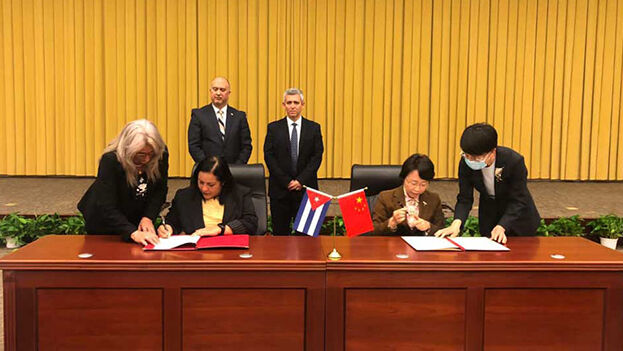
![]() 14ymedio, Havana, 5 April 2023 — On Monday, China signed an agreement with Cuba that details the collaboration between the two countries on matters of cybersecurity, as they had suggested in November. Press agency Prensa Latina celebrated the news that this compact lays the groundwork to build “an internet that supports development and wellbeing of the people.”
14ymedio, Havana, 5 April 2023 — On Monday, China signed an agreement with Cuba that details the collaboration between the two countries on matters of cybersecurity, as they had suggested in November. Press agency Prensa Latina celebrated the news that this compact lays the groundwork to build “an internet that supports development and wellbeing of the people.”
The agreement, which was signed by Mayra Arevich, Cuba’s Minister of Communication, and Cao Shuming, Representative of China’s Cyberspace Administration, marked the mission of a Cuban delegation to Beijing, headed by Vice Prime Minister Jorge Luis Perdomo.
During an interview with Prensa Latina, Perdomo stated that along with China they are working to strengthen the development of telecommunications on third and fourth generation — 3G and 4G — networks, as well as broadband, the deployment of which, he added, has not been completed because it is dependent on the Island’s economic capacity.
He said, “Chinese entities and collaboration with China are vital.” During the meetings they also reviewed the “actions” to continue with the digital television program, a project that began on the Island in 2013, with support from Beijing.
The cybersecurity ties with China go “beyond a commercial relationship,” and is considered, “a long-term strategic relationship,” in the economic and national security areas, said the vice prime minister. He added that information and communications technologies are being considered; they are “also platforms to destabilize politics, imperialist aggression in our country, political and ideological subversion.”
As you know, the Asian giant maintains strong control over the internet, with an organization specifically dedicated to this considered the most extensive and most sophisticated. The perfect example is the battalion of employees working 24 hours a day dedicated to reviewing any content or page that could a broad audience.
None of this is mentioned in the Cuban state-run press, the vice minister stated that the Island defends the sovereignty of each country to build a technology infrastructure that “it could use for its political, economic, and social development,” as well as “communicate” with other countries to safeguard “its national identity and values.”
The agreement was reached in the context of sanctions placed by the United States on several Chinese companies, such as ByteDance, owner of TikTok, for the repercussions it could have on its security. The Asian firm is called out for leaking data on American citizens to Beijing.
The state press stated that the Cuban delegation’s agenda included meetings with the Executive Vice President of China’s Development Bank, Wang Weidong, as well as with the President of the Insurance Credit Coorporation, Sheng Hetai. In addition, they held a meeting with Han Fangming, the president and founder of Charhar, an institute described as the thought center of “high professional ethics and global vision”, dedicated to promoting China’s political discourse to the international community.
The tour, which began last Thursday, also included visits to Information Industries and Technologies, the International Agency for Development and the National Health Commission. A visit to Changchung, in Jilin province, and a tour of mixed enterprise Changherber were scheduled for Tuesday.
The new rapprochement between Cuba and China comes five months after Miguel Díaz-Canel met with his counterpart Xi Jinping in November 2022, in a desperate search for financing amid a new economic and energy crisis. In that meeting, they agreed to disperse $100 million to reactivate important lines of industrial activity on the Island, production of renewable energy and cybersecurity.
The relationship between Cuba and China for cooperation in cyberspace is not new and there is evidence that dates back to 2014, long before the government authorized access to the internet on mobil phones. Nine years ago, Beijing and Havana signed an agreement to develop laws and regulations.
In 2014, one of then President Raúl Castro’s concerns was the “existence of a global system of telecommunications espionage” by the United States. Since then, according to several articles in the state press, the Cuban government has had more rapprochements with China and the issue has remained on the negotiating table.
While the government in Havana hawked the internet for development, the state monopoly, Etecsa, maintains control of telecommunications and restricts the telephone service of individuals on the island considered to be of interest.
In addition to China, in 2018, the Cuban informatics solutions firm, Softel signed an agreement with Russian Inoventica to build a regional cybersecurity center in Havana, although following the signing the state press has maintained complete silence on the topic.
Last week, another agreement was reached between Havanatur and Chinese tour operator Tumei International Travel to promote the Island to the Asian market as a “reliable and safe” destination. According to Rodrigo Wen, Vice General Manager for Tumei, Cuba is a priority on its agenda and is among the 20 countries approved by Beijing for group travel after reopening its borders after three years of COVID-19 isolation.
Translated by: Silvia Suárez
____________
COLLABORATE WITH OUR WORK: The 14ymedio team is committed to practicing serious journalism that reflects Cuba’s reality in all its depth. Thank you for joining us on this long journey. We invite you to continue supporting us by becoming a member of 14ymedio now. Together we can continue transforming journalism in Cuba.
